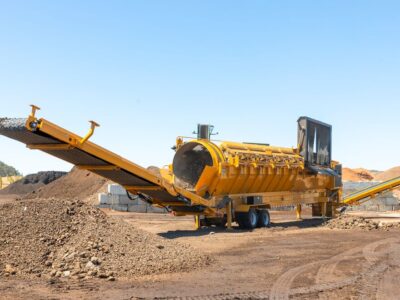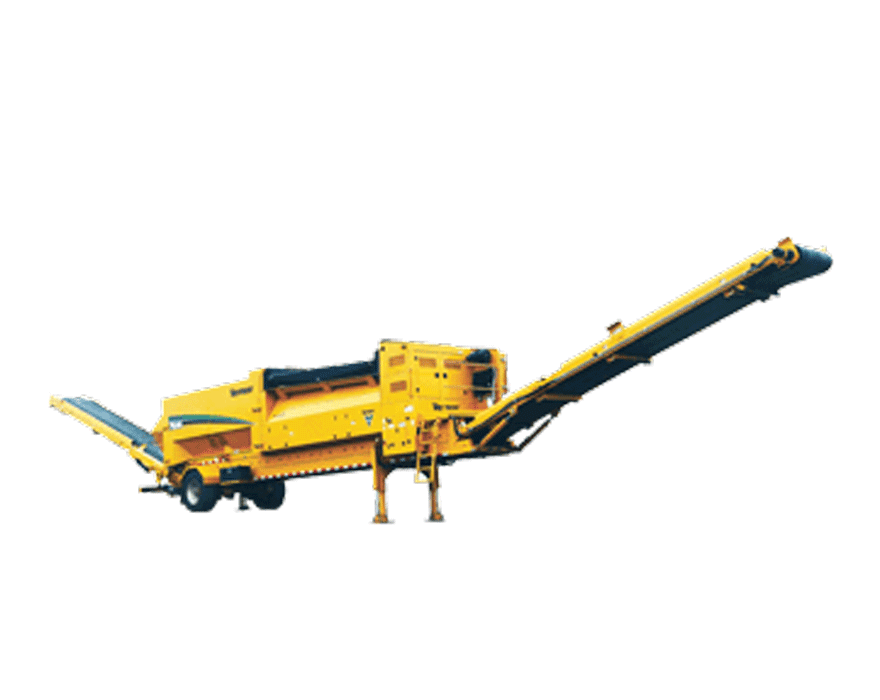What is a trommel screen?
How can a trommel screen expand your business?
How do you rent a trommel screen?
Vermeer offers a versatile range of trommel screens designed to meet your material processing needs. Whether you’re involved in recycling, mulch manufacturing, composting or aggregate processing, Vermeer trommel screens provide reliable solutions to help boost your productivity.
“Before we purchased the trommel screen, we’d been renting the same trommel screen from Vermeer Wisconsin,” said Jay Getka, fleet manager for the city of Kenosha, Wisconsin. “We knew we wanted to buy that exact trommel screen from Vermeer. It does a great job meeting our composting needs, produces a quality product, is easy to use and has only needed limited cleaning maintenance.”
Explore the FAQ below to find comprehensive answers to common questions about Vermeer trommel screens, including their design, functionality, rental options and support services.
What is a trommel screen?
A trommel screen is used to separate materials by size. It consists of a rotating cylindrical drum with perforated sides that allow smaller material to fall through while larger material moves to the end of the drum. Trommel screens are commonly used in the recycling, composting and aggregate processing industries.
What are approved jobs for a Vermeer trommel screen?
Vermeer trommel screens are versatile and can be used for a variety of applications, including:
- Composting, biomass and wood recycling
- Aggregate processing
- Topsoil screening
- Mulch production
What are the key features of Vermeer trommel screens that enhance productivity and efficiency?
Vermeer trommel screens are designed with several features to help enhance productivity and efficiency:
- Low hopper height with large capacity: Low hopper infeed height helps to decrease loading cycle times and eliminates the need for loading ramps with most loaders.
- Removable side access doors: Provide full access to the drum for easy maintenance and cleaning.
- Optional radial stacking conveyor: Available on select models, this allows for efficient stockpiling and loading directly into trucks.
- Reversible drum and feed conveyor: Helps prevent jams and ensures smooth operation.
- Tensioned screen design: Increases the open area of the screen and allows you to change screening size without changing drums.
How does the tensioned screen design help improve the performance of Vermeer trommel screens?
The tensioned screen design allows the screen to be clamped around the drum, adding rigidity and enabling the use of smaller gauge wire. This increases the open area of the screen, which helps improve productivity by allowing more material to pass through efficiently.
What are the different models of Vermeer trommel screens available, and how do they compare in terms of capacity and size?
Vermeer offers several models of trommel screens, varying in capacity and size:
- TR5300EM: 5 ft (1.52 m) drum diameter, 15 ft (4.57 m) drum length.
- TR5300: 5 ft (1.52 m) drum diameter, 15 ft (4.57 m) drum length.
- TR626: 6 ft (1.83 m) drum diameter, 26 ft (7.92 m) drum length.
- TR626EM: 6 ft (1.83 m) drum diameter, 26 ft (7.92 m) drum length.
- TR6400: 6.5 ft (1.98 m) drum diameter, 20 ft (6.10 m) drum length.
- TR6450: 6.5 ft (1.98 m) drum diameter, 20 ft (6.10 m) drum length.
Can you explain the maintenance requirements for Vermeer trommel screens?
Maintenance for Vermeer trommel screens includes regular cleaning and inspection of the drum and screens, lubrication of moving parts, and checking for wear and tear. The removable side access doors make it easy to access the drum for maintenance, and the tensioned screen design allows for quick screen changes.
How does the reversible drum and feed conveyor help in preventing jams?
The reversible drum and feed conveyor allow operators to reverse the direction of material flow, which can help clear jams and prevent material build-up. This feature allows continuous operation and helps reduce downtime to clear jams.
What options are available for customizing Vermeer trommel screens to fit specific needs?
Vermeer offers a range of options to customize trommel screens, including:
- Different screen sizes and configurations
- Optional radial stacking conveyor available on select models
- Customizable feed hoppers and conveyors
- Additional operational features
How does the low hopper height benefit the operation of Vermeer trommel screens?
The low feed hopper height and large capacity makes it easier to load material into the screening drum using various types of loading equipment, such as loaders and excavators. This design improves operational efficiency and reduces the risk of spillage.
What are the benefits of the optional radial stacking conveyor on select Vermeer trommel screen models?
The optional radial stacking conveyor allows for efficient stockpiling of screened material. It can swing a full 180 degrees, enabling operators to create large, uniform piles with less repositioning of the machine. This feature enhances productivity and reduces the need for additional handling equipment.
What materials are Vermeer trommel screens best suited for processing?
Vermeer trommel screens are best suited for processing a variety of materials, including:
- Compost
- Biomass
- Wood chips
- Topsoil/sand
- Light aggregates
- Mulch
Can I rent a trommel screen from Vermeer?
To rent a trommel screen, contact your local Vermeer dealer. They will provide information on availability, rental terms, and pricing. You can also request more information or find a dealer through the Vermeer website.
When should I rent a trommel screen?
Renting a trommel screen from a Vermeer dealer may be the smart choice in several scenarios:
- You have a short-term project: If your work project is temporary or seasonal, renting lets you use the equipment only when you need it.
- Your machine is broken: Avoid downtime if your machine needs repaired.
- Your budget calls for it: Renting can be more cost-effective for operators who need the equipment for a limited time and want to avoid the upfront costs associated with purchasing.
- You want to test equipment before you buy: If you’re unsure which trommel screen model best suits your needs, renting allows you to test different models before making a purchase decision.
- You need to stay flexible: Renting provides flexibility to scale your operations up or down based on project demands without the commitment of owning multiple machines.
For long-term or continuous use, owning a trommel screen might be more beneficial as it can be more cost-effective over time and allows for customization to fit specific operational needs.
How can I find a local dealer to rent a trommel screen?
Vermeer has over 600 dealers worldwide. Find your nearest Vermeer dealer using our dealer locator tool at Vermeer.com. Enter your location to find the nearest dealer who can assist with your rental needs.
Are there rent-to-purchase options available for trommel screens?
Yes, select Vermeer dealers offer rent-to-purchase options for trommel screens. This allows you to apply a portion of your rental payments towards the purchase price of the equipment. Contact your local Vermeer dealer to see if they offer rent-to-purchase options for trommel screens.
What kind of support and training does Vermeer provide for rental equipment?
Vermeer provides comprehensive support and training for rental equipment, including:
- Operator training
- Maintenance training
- Technical support
- Access to operator and maintenance manuals.
“It’s always good to have the support of an expert when trying to get a trommel screen set up in your operation,” Ted Dirkx, sales manager for Recycling and Forestry at Vermeer Corporation, said. “On-the-job support is something people don’t have to worry about with Vermeer. We have an extensive global dealer network, and many locations have highly trained recycling and forestry specialists on staff ready to help.”
What are the typical rental terms and conditions for Vermeer trommel screens?
Typical rental terms and conditions for Vermeer trommel screens typically include:
- Rental duration (daily, weekly, monthly)
- Rental rates and payment terms
- Maintenance and repair responsibilities
- Insurance requirements
- Return conditions and inspection.
Note: Rental terms and conditions may vary depending on location.
How does a Vermeer Recycling and Forestry specialist support customers after the sale?
Vermeer Recycling and Forestry specialists provide comprehensive support after the sale by offering operator training to maximize equipment performance and explaining maintenance procedures to help keep machines in optimal condition. They connect customers with the product support department and help them navigate the learning curve of new equipment. Specialists also provide best practices and inform customers about emerging market opportunities and specific job openings.
Vermeer Corporation reserves the right to make changes in engineering, design and specifications; add improvements; or discontinue manufacturing at any time without notice or obligation.
Equipment shown is for illustrative purposes only and may display optional accessories or components specific to their global region.
Please contact your local Vermeer dealer for more information on machine specifications.
Vermeer, the Vermeer logo and Equipped to Do More are trademarks of Vermeer Manufacturing Company in the U.S. and/or other countries.
© 2025 Vermeer Corporation. All Rights Reserved.

